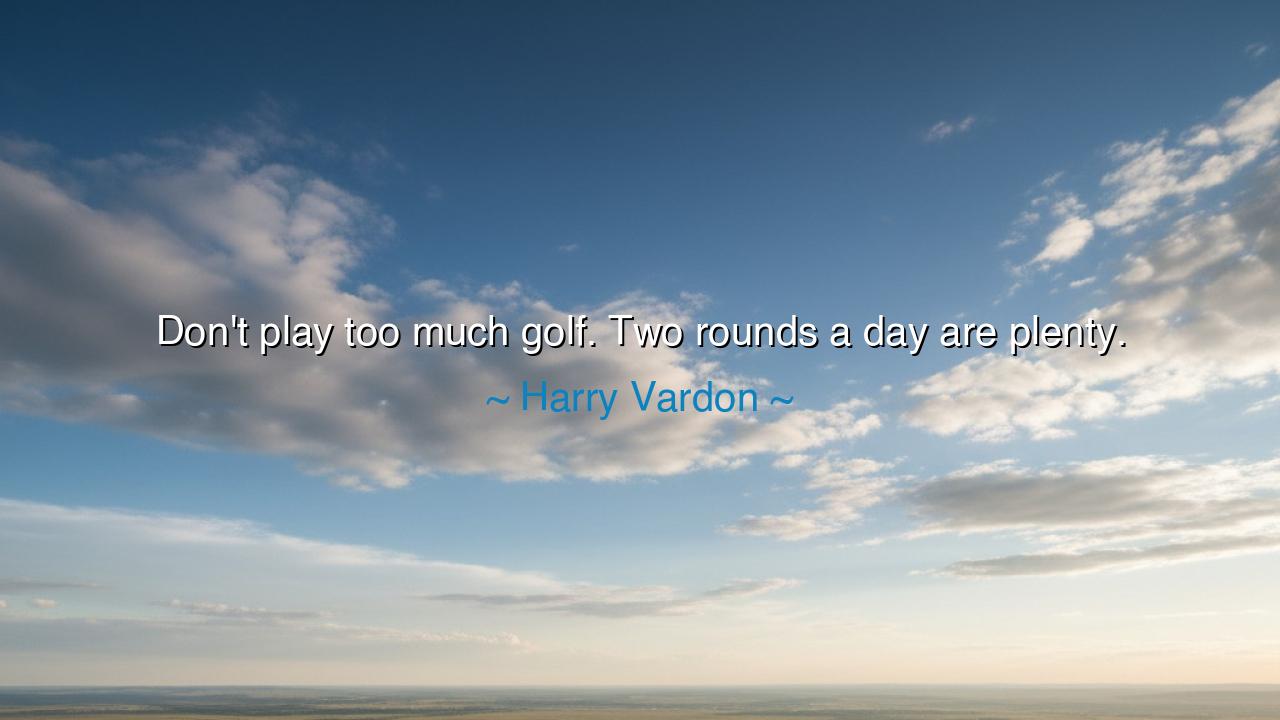
Don't play too much golf. Two rounds a day are plenty.






When Harry Vardon, the great English master of the links, declared, “Don’t play too much golf. Two rounds a day are plenty,” he spoke with a wry humor that concealed a deeper wisdom. To the casual ear, it sounds like jest, the playful exaggeration of a man devoted to his sport. But beneath the words lies an ancient truth about moderation, discipline, and the danger of excess—even in the pursuit of the things we love most.
The origin of this saying comes from Vardon’s own life as one of golf’s greatest champions. A six-time winner of The Open Championship, he was famed for his steady play and for perfecting the grip that still bears his name, the Vardon Grip. His success was not born of endless exhaustion, but of balance: of practice married with rest, of intensity tempered with patience. When he warned against “too much golf,” he was not only cautioning against physical strain, but also against the loss of joy that comes when passion becomes compulsion.
The ancients, too, would have honored this counsel. The Greeks, who exalted athletes in Olympia, preached sophrosyne, the virtue of moderation—neither too little nor too much, but balance that preserves harmony. The archer who pulls his bowstring too tight breaks it; the runner who trains beyond measure destroys his body. So too with golf, or any pursuit of life: to love it too greedily is to risk spoiling the very sweetness it offers. Vardon, in jest, expressed this timeless principle—that two rounds may be plenty, and beyond that lies the danger of weariness and futility.
Consider the story of Bobby Jones, the gentleman champion of the early 20th century. Jones dominated golf, yet at the age of 28, at the very peak of his powers, he retired from competition. He had achieved what no man had done—the Grand Slam of golf in a single year, 1930. But he knew that endless striving, endless rounds, would rob him of life’s balance. By stepping away, he preserved not only his body, but his dignity and his joy in the game. Like Vardon, Jones understood that greatness is not only in playing, but in knowing when to stop.
The lesson is clear: in life as in sport, excess can destroy the very thing it seeks to enlarge. Too much practice without rest leads to injury. Too much ambition without pause leads to burnout. Too much indulgence in pleasure leads to emptiness. We must learn, as Vardon taught, that even in the things we love, we must honor limits, for limits preserve joy and sustain strength.
What then must we do? First, recognize the value of balance. Work hard, but rest as well; strive for greatness, but do not become enslaved by it. Second, savor your passions without devouring them—leave space for joy to renew itself. Third, apply this wisdom broadly: in relationships, in work, in leisure, remember that moderation preserves while excess consumes.
Thus, Harry Vardon’s playful remark endures as more than a jest: “Two rounds a day are plenty.” It is a reminder that wisdom is often clothed in humor, and that the path to lasting greatness is not paved with endless toil, but with measured effort, balance, and joy preserved. Let us then play the game of life as Vardon played golf—steady, disciplined, and always aware that too much, even of a good thing, can turn victory into defeat.






AAdministratorAdministrator
Welcome, honored guests. Please leave a comment, we will respond soon